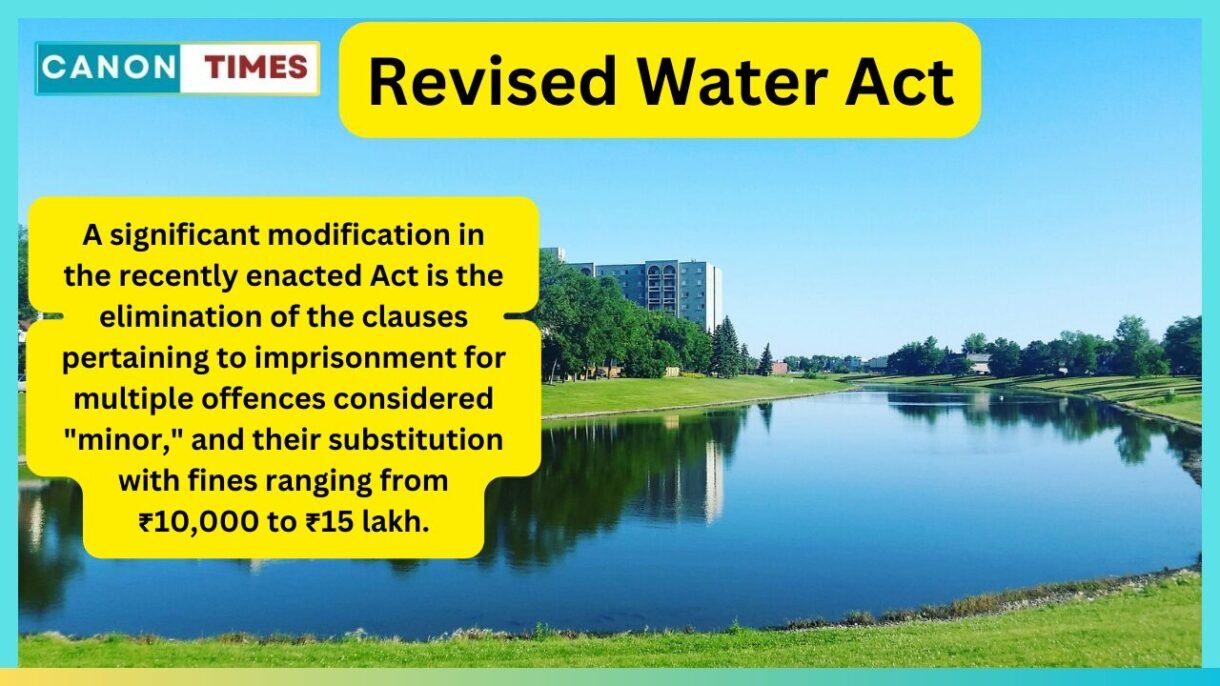Will the laws protecting rivers and other water bodies from industrial contamination be made weaker by the amendments?
The Water (Prevention and Control of Pollution) Amendment Act, 2024 was approved by the Lok Sabha this past week. This law, which was presented and approved by the Rajya Sabha on February 5, modifies the Water (Prevention and Control of Pollution) Act, 1974 in significant ways.
A significant modification in the recently enacted Act is the elimination of the clauses pertaining to imprisonment for multiple offences considered “minor,” and their substitution with fines ranging from ₹10,000 to ₹15 lakh.
The Water (Prevention and Control of Pollution) Act of 1974: What is it?
This Act was the first piece of legislation in India after independence to recognise the necessity for an institutional framework to handle water body pollution. As a result, the Central Pollution Control Boards (CPCB) and State Pollution Control Boards (SPCB) were established in September 1974 with the responsibility of keeping an eye on and guarding against the contamination of public water supplies by sewage and industrial effluents. This Act required industrial units to get authorization from the relevant State bodies prior to establishing factories and to subject to inspections to ensure that their production and other operations were in compliance with established standards.
“To preserve and restore the wholesomeness of our water bodies, the Indian Parliament wisely passed the Water (Prevention and Control of Pollution) Act in 1974. The Central Pollution Control Board (CPCB) website states that one of the organization’s responsibilities is to gather, compile, and distribute statistical and technical information about water pollution. Although the CPCB has the authority to carry out inspections and offer advice on technical standards that must be followed, the SPCB handles complaints and is supposed to ensure compliance. Industries that violate the Water Act may face closure, financial penalties, and a maximum six-year jail sentence. Having said that, there have been no reports of businesses or individuals in India being put in jail because they violated environmental laws.
What changes have been made?
Since water is a state matter, the federal government cannot directly enact laws governing water management. On the other hand, if two or more States request it, the Centre may enact law, which the States may then apply beyond their borders provided their assemblies approve it. Following passage by both Houses of Parliament, the Act has been revised and is now applicable to the Union territories, Rajasthan, and Himachal Pradesh. There are 25 states where the 1974 original Act is operative.
The most significant modification is the elimination of the clause that stipulated jail time for several offences that were considered “minor,” and its replacement with fines ranging from ₹10,000 to ₹15 lakh.
Any industrial or treatment facility that would release sewage into a water body, sewer, or piece of land would require the approval of the SPCB, according to the original Act. The Bill specifies that the Centre “may exempt certain categories of industrial plants from obtaining such consent,” “in consultation with the CPCB,” in the modification.
Nonetheless, you risk a six-year prison sentence and a fine if you operate or build an industrial unit without the SPCB’s approval.
The Bill further states that guidelines for the granting, rejecting, or rescinding of approval given by the SPCB may be issued by the Centre. Additionally, tampering with monitoring devices that are used to assess the suitability of setting up a business or treatment plant is penalised. The fine would range from ₹10,000 to ₹15 lakh. The modified Act also gives the Centre the authority to create guidelines for the appointment of SPCB chairs and to set criteria that the States may adhere to when creating new industries and operational procedures.
What has been the answer thus far?
Bhupendra Yadav, the Environment Minister who led the Bill, explained the reasoning behind the revisions by stating that antiquated laws and regulations created a “trust deficit.” The imprisonment provisions for minor infractions—basic transgressions that do not result in harm to people or the environment—often caused “harassment” to citizens and businesses and were out of step with the spirit of “ease of living and ease of doing business,” he continued.
Members of opposition parties expressed concern during the Lok Sabha’s Act discussion that the revisions undermined the legislation protecting rivers and other water bodies from industrial pollution. They said that industrial units that were slack in adhering to tight requirements were effectively discouraged by the prospect of incarceration.
Dr. Abhishek Verma
Author: This news is edited by: Abhishek Verma, (Editor, CANON TIMES)
Authentic news.






